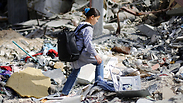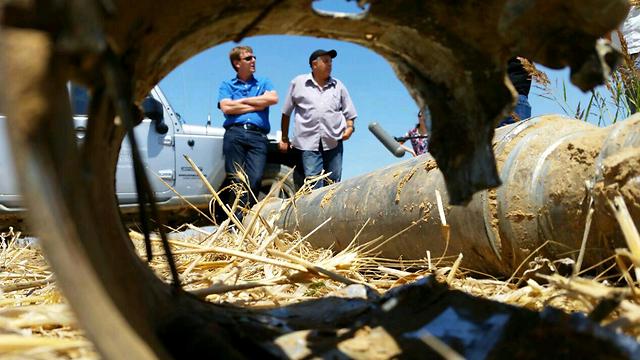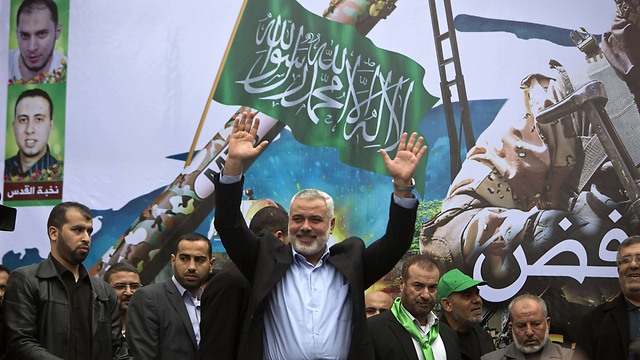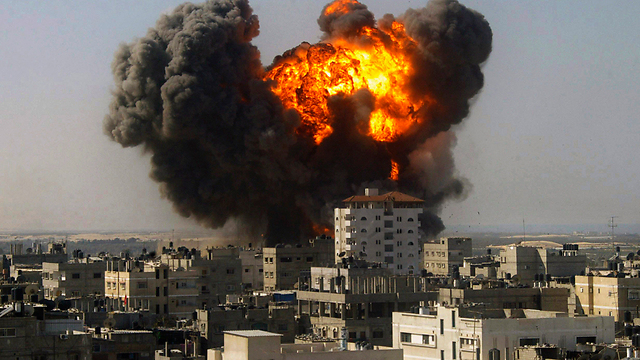
How to stop the sporadic rocket fire from Gaza
Analysis: While Hamas can be deterred by Israel, the armed Salafi-jihadist groups affiliated with ISIS or al-Qaeda can only be neutralized through a sophisticated simultaneous use of a civilian carrot and a military stick.
The rebels want us to hit their enemies in the Strip hard, but Israel has a clear interest to have a governmental authority in Gaza which will prevent chaos like the one taking place in Syria, Iraq and Yemen.
Hamas is a governmental authority which has something to lose, so it can be deterred, and even negotiate a long-term calm. The armed groups which have pledged allegiance to ISIS or al-Qaeda are different, and must therefore be neutralized.
This can be done through a sophisticated simultaneous use of a civilian carrot and a military stick. The civilian carrot is a major operation to rebuild the Strip and its economy.

Starting up such a project at a full scope and in a quick timetable with international funding will provide a dignified livelihood and employment for thousands of young unemployed people. It will make the Salafis-jihadists' family members restrain their "loved ones" so as not to sabotage the chance that they will finally have a roof over their heads and a dignified livelihood. Today, the clans have no motivation to confront the bored and incited young men hanging around the mosques.
Launching a reconstruction project requires the money which the donor countries are not funneling to the Strip at the moment. Some $5.3 billion have been promised, but the money has not arrived in Gaza because the Europeans and Arabs don't want to fund projects whose products will be destroyed in the next round of fighting. A long-term "tahadiya" (lull) requires reconstruction, and a lull is needed in order to achieve reconstruction.

This paradox is another reason why Israel must come up with a military way of action to suppress the provocative rocket fire by the ISIS loyalists. The demand to form an efficient military pattern of action against the Salafis-jihadists stems first and foremost from the need to provide security and a sense of security to the residents of southern and central Israel.
The IDF has three ways of action which have a chance to prevent the next sporadic rocket fire from the Strip:
1. A major Cast Lead-style military operation, including a ground offensive to conquer the Strip's main cities. At the end of the operation, the IDF and the Shin Bet will remain on the occupied territory for a period of six months up to a year and work to clear out all the elements of terror.
The advantage of this way of action is that it can deal a critical blow only to the jihadists but also to the military wings of Hamas and the Islamic Jihad, and more importantly – to their infrastructures above and below the ground.
The advantages are also clear: Casualties, an astronomic economic price and diplomatic trouble in the international arena.
2. Declaring Hamas, as the representative governmental authority in the Strip, responsible for preventing rocket fire from its territory – every rocket, even if it is fired by "rebels" against Hamas. According to this principle, the IDF will respond to every rocket which is fired from the Strip and explodes on Israeli territory by targeting Hamas' military and civilian assets.
The ongoing rocket fire from the Strip is being answered by the IDF with responses which are becoming increasingly serious and destructive. The IDF's restrained responses are aimed at claiming a heavier price from Hamas each time, but without bringing down the organization. The goal is to make Hamas consider whether it is willing to take these Israeli blows, which will only be aggravated, including a major operation threatening its rule in the Strip, or whether it should launch a major systematic operation which will disable the armed groups of the ISIS and al-Qaeda supporters for a very long time.
When Hamas wants to – in other words, when jihadists risk its sovereignty in the Strip – its operational force, together with the Izz al-Din al-Qassam Brigades, knows how to crush its rivals. We saw proof of that in August 2009 in Rafah, when an armed group inspired by al-Qaeda challenged Hamas and declared an "Islamic emirate." The group members entrenched themselves in the Ibn Taymiyyah Mosque, but Hamas did not hesitate and killed 16 of them, including the sheikh who led them.
Now, six years later, there is a similar situation and Israel expects Hamas to act the same way and with the same determination. The IDF must make them do it. This is the Israeli government and defense establishment's preferable method right now.
The main advantage of this restrained pattern of action is that Israel is preserving a governmental authority in the Strip and forcing it to restrain the "rebels." The disadvantage is that at least for now, Hamas is dragging its feet and is afraid to confront the Salafis-jihadists, and so Israel must adopt a third way of action.
3. Direct action against the Salafis-jihadists. Everything the Shin Bet and IDF know how to do and have done in the past in the Gaza Strip: Thwarting terror attacks as they happen, including rocket and mortar shell fire, targeted and systematic assassination of leaders and senior activists, and targeting terror infrastructures.
The disadvantage is that such an activity could lead to an undesirable flare-up, as Hamas will be challenged and its military wing will feel the need to show resistance.
Another problem is that critically harming the Salafis-jihadists requires a lot of accurate, detailed and reliable intelligence, like the intelligence provided and used by the Shin Bet and Military Intelligence Directorate to thwart terror activities in Judea and Samaria. But the Israeli security forces are not present in Gaza as they are in Judea and Samaria, so collecting intelligence at the required quantity and quality could take a very long time and require many resources.
I believe that at the end of the day, the IDF and Shin Bet will get an order from the defense minister and prime minister and do what needs to be done in the area of intelligence collection and in the operational field to suppress the jihadists. The question is when will it happen – and if it does, will it lead to an escalation and to another round, as those who oppose this way of action fear.
It's important to remember that the IDF and Shin Bet can efficiently suppress the rocket fire created by the ISIS and al-Qaeda branches in Gaza, as long as they have intelligence and a cabinet decision. But the key to a long-term preservation of the calm in the Strip is the civilian reconstruction.











